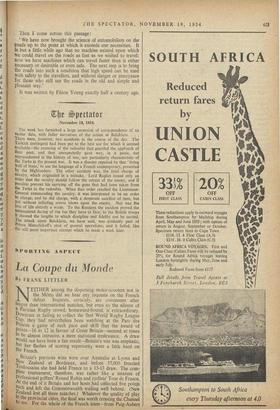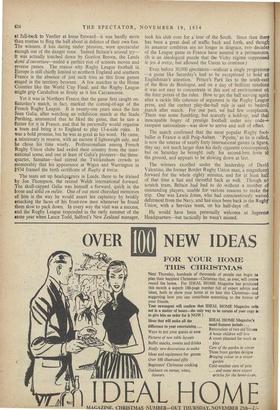PORTINC1 ASPECT
La Coupe du Monde
BY' FRANK LITTLER
EITHER among the dispersing motor-scooters nor in the Mdtro did we hear any inquests on the French defeat. Inquests, certainly, are commoner after league than international matches, but even so the silence of a., Parisian Rugby crowd, homeward-bound, is' extraordinary. Downcast at failing to collect the first World Rugby League Cup, they had nevertheless been watching at the Parc des Princes a game of such pace and skill that the award of Points—I6 to 12 in favour of Great Britain—seemed at times to be almost intrusive, a mere statistical irrelevance. A draw would not have been a fair result—Britain's win was emphatic, but her' flashes of scoring superiority were a little hard on the French.
Britain's previous wins were over Australia at Lyons and New Zealand at Bordeaux, and before 37,000 frenzied Toulousains she had held France to a 13-13 draw. The com- plete tournament, therefore, was rather like a mixture of professional golfers' Round Robin and cyclists' Tour de France. At the end of it Britain and her hosts had collected five points each and left the Commonwealth trailing well behind. (New Zealand lost all three matches.) Whatever the quality of play in the provincial cities, the final was worth crossing the Channel to see, For the whole of the French team—from Puig-Aubert Ist full-back to Verdier at loose forward—it was hardly more than routine to fling the ball about in defence of their own-line. The winners, if less daring under pressure, were spectacular enough out of the danger zone. Indeed Britain's second try— it was actually touched down by Gordon Brown, the Leeds demi d'ouverture—ended a perfect riot of scissors moves and reverse passes. The reason why Rugby League football in Europe is still chiefly limited to northern England and southern France is the absence of just such tries as this from games staged in the territory between. A few matches in the Home Counties like the World Cup Final, and the Rugby League might grip Carshalton as firmly as it has Carcassonne.
Yet it was in Northern France that the game first caught on. Saturday's match, in fact, marked the coming-of-age of the French Rugby League. It is twenty-one years since the late lean Galia, after watching an exhibition match at the Stade, Pershing, announced that he liked the game, that he saw a future for it in France, and that he personally would organise a team and bring it to England to play 13-a-side rules. It was a bold promise, but he was as good as his word. He came, a missionary in reyerse, with an earnest if lightweight side, and he chose his time wisely. Professionalism among French Rugby Union clubs had exiled their country from the inter- national scene, and one at least of Galia's pioneers—the three- quarter, Samatan—had stirred the Twickenham crowds so memorably that his appearance at Wigan and Warrington in 11934 framed the birth certificate of Rugby d treize.
The team set up headqugrters in Leeds, there to be trained by Joe Thompson, the retired Welsh international forward. The skull-capped Galia was himself a 'forward, quick in the loose and solid en mêlée. One of our most cherished memories of him is the way he would assert his captaincy by briskly smacking the faces of his front-row men whenever he found them slow to pack down. In every way the visit was a success, and the Rugby League responded in the early summer of the same year when Lance Todd, Salford's New Zealand manager, took his club over for a tour of the South. Since then there has been a great deal of traffic back and forth, and thougll its amateur confreres are no longer in disgrace, two decade$ of the League game in France have assured it a permanence! (It is an ideological puzzle that the Vichy regime suppressed le jeu d treize, but allowed the Union to continue.) Even before 30,000 spectators—without a single programme —a game like Saturday's had to be exceptional to hold an Englishman's attention. Prince's Park lies to the south-east of the Bois de Boulogne, and on a day of brilliant sunshine it was not easy to concentrate in this sort of environment or) the finer points of the rules. How to get the ball moving agaiq after a tackle fills columns of argument in the Rugby League press, and the curknt play-the-ball rule is said to bedevil patch after match. For our part, we had few complaintS, -"There was some fumbling, but scarcely a hold-up, and that inescapable bogey of prestige football under any code–e rampant nationalism—was slow to arrive and null of effect.
The match confirmed that the most popular Rugby foot. bailer in France is still Puig-Aubert. Pipette,' as he is called, is now the veteran of nearly forty international games (a figure, they say, not much larger than his daily cigarette consumption), but on Saturday he brought only his second-best botte t4 the ground, and appears to be slowing down at last.
The winners excelled under the leadership of David Valentine, the former Border Rugby Union man, a magnificen forward for the whole eighty minutes, and for at least hal of that time a fast and thrustful back as well. Though nd scratch team, Britain had had to do without a number of outstanding players, unable for various reasons to make the trip. One was Lewis Jones, who had conscientiously waived deferment from the Navy, and has since been back in the Rugby Union, with a Servides team, on his half-days off.
He would have been personally welcome at Supreme Headquarters—but tactically he wasn't missed.











































































 Previous page
Previous page